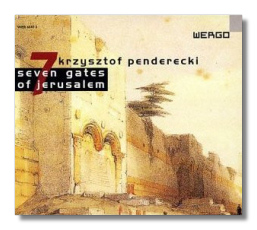
The Internet's Premier Classical Music Source
Related Links
- Penderecki Reviews
- Latest Reviews
- More Reviews
-
By Composer
-
Collections
DVD & Blu-ray
Books
Concert Reviews
Articles/Interviews
Software
Audio
Search Amazon
Recommended Links
Site News
 CD Review
CD Review
Krzysztof Penderecki

Symphony #7 "Seven Gates of Jerusalem"
Bożena Harasimowicz & Izabella Kłosińska, sopranos
Jadwiga Rappé, alto
Wieslaw Ochman, tenor
Romuald Tesarowicz, bass
Boris Carmeli, voice
Warsaw's National Philharmonic Choir and Orchestra/Antoni Wit
Wergo WER 6647-2
Just when I thought Penderecki had outdone himself with last years' heaven-storming Credo (Hänssler CD 98.311), he comes up with this: a sacred choral symphony. (He calls it his Symphony #7 because he's still working on Symphony #6.). It is a haunting, doleful, exciting, scary, and ultimately exultant work. By focussing on obscure psalms and other Old Testament passages, he avoids the boilerplate text common to most sacred music. For the second movement, a contralto sings an atonal passage: "If I forget you, O Jerusalem, may my right hand forget its skill," followed by an ominous repeating ten-note figure suggesting such forgetting would be bad indeed. The third movement, a choral passage of dulcet sonority, alternates between a mono- and polychoral structure. A plea for hope and mercy, it lulls the listener into a false cove of comfort. For in the next movement, the "right hand" passage returns with a vengeance, accompanied by unstable rising and ascending figures. For religious music, these unsettling themes consistently belie the comforting message in the words. Something frightening is about to happen, but not yet. In a scherzo Carl Orff would have been relished, several male and female choruses extol the Lord with rapid staccato tones punctuated by startling percussive effects. A mournful adagio is sandwiched between the scherzo's reprise, deftly establishing contrast. The penultimate movement is one of the most bizarre passages I've ever heard. A speaker (Boris Carmeli) narrates – in Hebrew with stirring diction – the spooky Ezekiel 37:1-10, the one in which the Lord induces the prophet Ezekiel to animate a vast army from a valley of dry bones. Perhaps this is a metaphor for Israel arising from the ashes of the Holocaust. The music is atmospheric without being intrusive: temple blocks provide necessary clatter. For the voice of God, Penderecki introduces a bass trumpet solo. The clashing finale is so glorious it feels like the conclusion of Mahler's Eighth, but with a modernist balance between dread and rhapsody.
From the opening tubaphone salvo, through edgy polychoral dialogues and plaintive solos, the sound on this live recording never fails. (It is even cough & sneeze-free.) Warsaw's National Philharmonic Choir and Orchestra have produced an unforgettable premier recording.
Copyright © 2001, Peter Bates




















